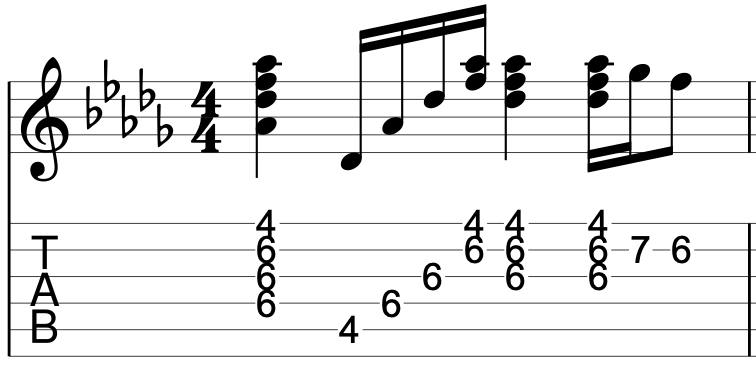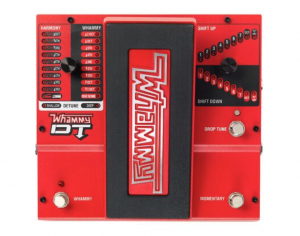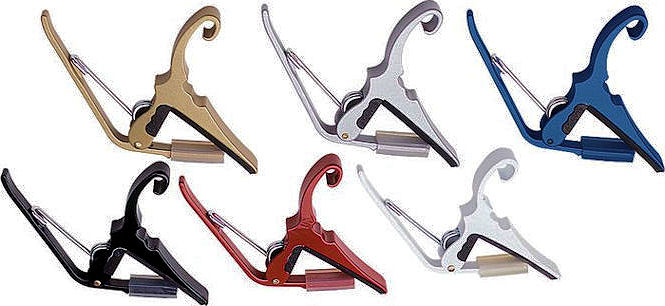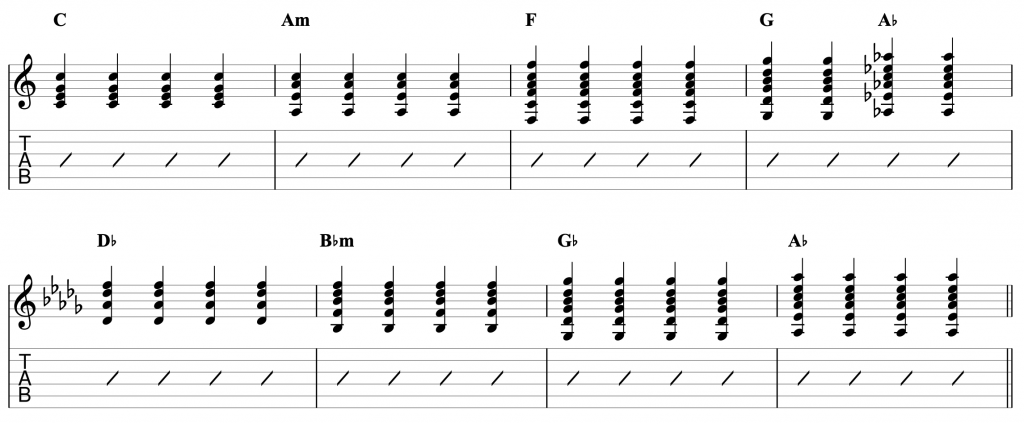
Db major is not a friendly key on the guitar. The main reason is that not one of the open strings is diatonic, meaning none of the open string notes belong to the scale Db Major. There are also no diatonic open position chords, so accidentally playing an open string can be an unforgiving mistake. To get an idea of this, try playing the example below.

Ouch. You could hurt people with those open strings!
It is easier to play in the key of D or C and get a sound that is similar and more playable. Notice that playing full chords in Db major involves using more barre chords.

Some of the best solutions to playing in Db Major for Rock, Metal, and even pop players are as follows…
1. Tune Down
Tune down your strings a 1/2 step (Eb Ab Db Gb Bb Eb), then play in the key of D (a much friendlier guitar key!). It will sound as Db. Some popular examples of this would be the Guns ‘n Roses classic, “Sweet Child ‘O Mine” or the Killers’ “Mr. Brightside.”
2. Use a pitch shifting pedal, such as the Digitech Whammy
This is the same concept as tuning down, but you can achieve this sound by simply setting your pedal up to sound as a 1/2 step down. Just be sure to play with an amplifier at a volume louder than the acoustical sound of your electric strings or your ear will hear a m2 harmonic interval with every single note!

3. Use a capo
Instead of going down in pitch, you can go up with a capo. Throw a capo on the 1st fret, then simply play in the key of C. There are other options as well, but for a song that is mostly in Db, this is a great option for making the song easier to play, and typically will sound better too.

All of the above options are simply tools or ideas to help a song sound better. They are sometimes thought of as work-arounds or even cheating, but remember that the goal is to make music, not to follow some unwritten code of ethics about how a song should or shouldn’t be played. Nobody cares if you do any of these if the song sounds good!
So Why Practice Db Major at all?
Ok, so why should we bother practicing Db major in standard tuning at all? The reason is because the key of Db actually pops up in standard tuning from time to time, and will be a problem if you don’t take a look at it. Let’s look at a few instances Db might show up.
1. Modulation
Typically it occurs when a song modulates. You’re cruising along in the key of C, no problem, then towards the end the song modulates up a half step to Db. Try the example below to see what I mean.

Modulating up a half step like this sometimes happens at the end of a song.
2. Piano Music
Db Major is not a terribly difficult key to play on piano, so it does come up when playing with piano players or learning a piano piece on guitar. One cool trick my Dad, a pianist with nearly 80 years experience, taught me was to think of Db not as having 5 flats, but rather that Db major has 2 naturals (F and C) similar to how D major has two sharps (F# and C#).
D Major: D E F# G A B C#
Db Major: Db Eb F Gb Ab Bb C
3. Jazz and Blues
A good example of Db major would be in the jazz standard, Blue Bossa. The song is mostly played in Cm, but one section is in Db major. To play fluidly on a song like this, both of these keys need to feel very comfortable to play in and out of. You don’t want to be improvising fluently in C minor but then dread that modulation to Db Major when it comes.
4. Murphy’s Law
The danger of relying on some of the creative solutions such as relying on a pedal or a capo is that sometimes these things can fail. Consider what would happen at a gig if your pitch shifting pedal stopped working or if you simply forgot your capo. One shouldn’t expect the band to change keys simply because of equipment failure, forgetfulness, or lack of preparation.
The reality is that while Db major is an uncommon key on the guitar, it does appear from time to time, so it’s not the worst idea to take a look at this key and be able to play it competently in standard tuning.
WHO THIS IS FOR
Guitarists or any musicians at an intermediate level or higher, especially blues and jazz players. Anyone who feels comfortable with the most common keys and seeks to improve their musicianship and their playing. Professional and/or gigging musicians.
WHO THIS IS NOT FOR… YET
Beginners. If playing an Em7 is still too hard, then there are a lot of other things to practice first. Start with more common keys like C, G, D, A, and E first. Practicing Db Major is not essential for beginners yet but may become important as the beginner’s skills and guitar goals change.
C# Major
It should be noted that C# Major is enharmonically the same as Db major, but is even less common.
Db Major: Db Eb F Gb Ab Bb C
C# Major: C# D# E# F# G# A# B#
The notes and chords sound the same as Db major, but have chord names that most musicians don’t want to see, such as E#m or B#m7b5. C# Major is typically only seen in classical music. Practicing C# Major is really only for professional musicians and those who already have a command of basic keys and seek to be thoroughly prepared for literally any key.
Where do you stand? Do you practice in every key, even uncommon keys such as Db? Let me know in the comments below or by getting in touch with me on social media. Keep shredding and woodshedding!
